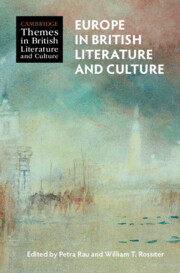Book contents
- Europe in British Literature and Culture
- Cambridge Themes in British Literature and Culture
- Europe in British Literature and Culture
- Copyright page
- Contents
- Illustrations
- Contributors
- General Editor’s Preface
- Acknowledgements
- Introduction
- Part I Zones of Influence
- Part II Pan-European Moods and Movements
- Part III Cultural Transfers
- Chapter 12 Early Modern Print Technologies
- Chapter 13 Diplomacy
- Chapter 14 Grand Tours and Sentimental Journeys
- Chapter 15 Folk and Fairy Tales
- Chapter 16 Translation
- Chapter 17 More or Less English
- Chapter 18 Holocaust Education and Commemoration in Britain
- Chapter 19 Critical and Literary Theory
- Chapter 20 Culinary Longings
- Part IV Anxious Neighbourhoods, Uncertain Futures
- Index
Chapter 14 - Grand Tours and Sentimental Journeys
from Part III - Cultural Transfers
Published online by Cambridge University Press: 06 June 2024
- Europe in British Literature and Culture
- Cambridge Themes in British Literature and Culture
- Europe in British Literature and Culture
- Copyright page
- Contents
- Illustrations
- Contributors
- General Editor’s Preface
- Acknowledgements
- Introduction
- Part I Zones of Influence
- Part II Pan-European Moods and Movements
- Part III Cultural Transfers
- Chapter 12 Early Modern Print Technologies
- Chapter 13 Diplomacy
- Chapter 14 Grand Tours and Sentimental Journeys
- Chapter 15 Folk and Fairy Tales
- Chapter 16 Translation
- Chapter 17 More or Less English
- Chapter 18 Holocaust Education and Commemoration in Britain
- Chapter 19 Critical and Literary Theory
- Chapter 20 Culinary Longings
- Part IV Anxious Neighbourhoods, Uncertain Futures
- Index
Summary
This chapter examines the ways in which Grand Tour narratives developed through the seventeenth and eighteenth centuries, and contributed to the conception of Europe in that period. It includes Joseph Addison’s Remarks on Several Parts of Italy &c (1705), Laurence Sterne’s A Sentimental Journey Through France and Italy (1768), and Mary Wollstonecraft’s Letters Written During a Short Residence in Sweden, Norway, and Denmark (1796) and argues that in the later eighteenth century the description of Europe via a part (classical Italy) gives way to an emphasis on the particular. Recent critical attention to slowness, microspection and proximate ethnography in travel writing studies is applied to Grand Tour sentimentalism and satire in order to propose the value of reading such texts as examples of vertical travel. Late eighteenth- and early nineteenth-century women’s contributions to Grand Tour writing and discourse rearticulated some of the motifs of stillness and intimacy popularised by earlier writers such as Sterne but introduce new frameworks for thinking about Europe which include its possibilities as a site for shared, familial experience.
Keywords
- Type
- Chapter
- Information
- Europe in British Literature and Culture , pp. 229 - 243Publisher: Cambridge University PressPrint publication year: 2024

